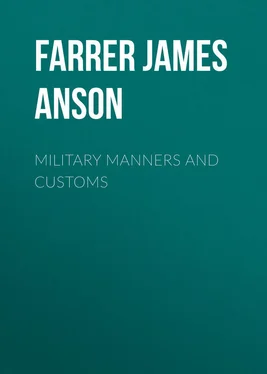James Farrer - Military Manners and Customs
Здесь есть возможность читать онлайн «James Farrer - Military Manners and Customs» — ознакомительный отрывок электронной книги совершенно бесплатно, а после прочтения отрывка купить полную версию. В некоторых случаях можно слушать аудио, скачать через торрент в формате fb2 и присутствует краткое содержание. Жанр: foreign_antique, foreign_prose, на английском языке. Описание произведения, (предисловие) а так же отзывы посетителей доступны на портале библиотеки ЛибКат.
- Название:Military Manners and Customs
- Автор:
- Жанр:
- Год:неизвестен
- ISBN:нет данных
- Рейтинг книги:5 / 5. Голосов: 1
-
Избранное:Добавить в избранное
- Отзывы:
-
Ваша оценка:
- 100
- 1
- 2
- 3
- 4
- 5
Military Manners and Customs: краткое содержание, описание и аннотация
Предлагаем к чтению аннотацию, описание, краткое содержание или предисловие (зависит от того, что написал сам автор книги «Military Manners and Customs»). Если вы не нашли необходимую информацию о книге — напишите в комментариях, мы постараемся отыскать её.
Military Manners and Customs — читать онлайн ознакомительный отрывок
Ниже представлен текст книги, разбитый по страницам. Система сохранения места последней прочитанной страницы, позволяет с удобством читать онлайн бесплатно книгу «Military Manners and Customs», без необходимости каждый раз заново искать на чём Вы остановились. Поставьте закладку, и сможете в любой момент перейти на страницу, на которой закончили чтение.
Интервал:
Закладка:
Gustavus Adolphus, in 1627, issued some humane Articles of War, which forbade, among other things, injuries to old men, women, and children. Yet within a few years the Swedish soldiery, like other troops of their time, made the gratuitous torture and mutilation of combatants or non-combatants a common episode of their military proceedings. 26 26 See Raumer’s Geschichte Europa’s , iii. 509-603, if any doubt is felt about the fact.
When Henry V. of England invaded France, early in the fifteenth century, he forbade in his General Orders the wanton injury of property, insults to women, or gratuitous bloodshed. Yet four centuries later the character of war had so little changed that we find the Duke of Wellington, when invading the same country, lamenting in a General Order that, ‘according to all the information which the Commander of the Forces had received, outrages of all descriptions’ had been committed by his troops, ‘in presence even of their officers, who took no pains whatever to prevent them.’ 27 27 General Order of October 9, 1813. Compare those of May 29, 1809, March 25, 1810, June 10, 1812, and July 9, 1813.
The French complain that their last war with Germany was not war, but robbery; as if pillage and war had ever been distinct in fact or were distinguishable in thought. There appears to have been very little limit to the robbery that was committed under the name of contributions; yet Vattel tells us that, though in his time the practice had died out, the belligerent sovereigns, in the wars of Louis XIV., used to regulate by treaty the extent of hostile territory in which each might levy contributions, together with the amount which might be levied, and the manner in which the levying parties were to conduct themselves. 28 28 Vattel, iii. ix. 165.
Is it not proved then by the above facts, that the laws of war rather fluctuate from age to age within somewhat narrow limits than permanently improve, and that they are apt to lose in one direction whatever they gain in another? Humanity in warfare now, as in antiquity, remains the exception, not the rule; and may be found now, as at all times, in books or in the finer imaginations of a few, far more often than in the real life of the battle-field. The plea of shortening the horrors of war is always the plea for carrying them to an extreme; as by Louvois for devastating the Palatinate, or by Suchet, the French general, for driving the helpless women and children into the citadel of Lerida, and for then shelling them all night with the humane object of bringing the governor to a speedier surrender. 29 29 Sir W. Napier ( Peninsular War , ii. 322) says of the proceeding that it was ‘politic indeed, yet scarcely to be admitted within the pale of civilised warfare.’ It occurred in May 1810.
Writers on the Law of Nations have in fact led us into a Fool’s Paradise about war (which has done more than anything else to keep the custom in existence), by representing it as something quite mild and almost refined in modern times. Vattel, the Swiss jurist, set the example. He published his work on the rights of nations two years after the Seven Years’ War had begun, and he speaks of the European nations in his time as waging their wars ‘with great moderation and generosity,’ the very year before Marshal Belleisle gave orders to make Westphalia a desert. Vattel too it was who first appealed to the amenities that occasionally interrupt hostilities in support of his theory of the generosity of modern warfare.
But what after all does it come to, if rival generals address each other in terms of civility or interchange acceptable gifts? At Sebastopol, the English Sir Edmond Lyons sent the Russian Admiral Machinoff the present of a fat buck, the latter acknowledging the compliment with the return of a hard Dutch cheese. At Gibraltar, when the men of Elliot’s garrison were suffering severely from scurvy, Crillon sent them a cartload of carrots. These things have always occurred even in the fiercest times of military barbarism. At the siege of Orleans (1429) the Earl of Suffolk sent the French commander Dunois a present of dessert, consisting of figs, dates, and raisins; and Dunois in return sent Suffolk some fur for his cloak; yet there was little limit in those days to the ferocity shown in war by the French and English to one another. A ransom was extorted even for the bodies of the slain. The occasional gleams of humanity in the history of war count for nothing in the general picture of its savagery.
The jurists in this way have helped to give a totally false colour to the real nature of war; and scarcely a day passes in a modern campaign that does not give the lie to the rules laid down in the ponderous tomes of the international-law writers. It is said that Gustavus Adolphus always had with him in camp a copy of ‘Grotius,’ as Alexander is said to have slept over Homer. The improbability of finding a copy of ‘Grotius’ in a modern camp may be taken as an illustration of the neglect that has long since fallen on the restraints with which our publicists have sought to fetter our generals, and of the futility of all such endeavours.
All honour to Grotius for having sought to make warfare a few degrees less atrocious than he found it; but let us not therefore deceive ourselves into an extravagant belief in the efficacy of his labours. Kant, who lived later, and had the same problem to face, cherished no such delusion as to the possibility of humanising warfare, but went straight to the point of trying to stop it altogether; and Kant was in every point the better reasoner. Either would doubtless have regarded the other’s reasoning on the subject as Utopian; but which with the better reason?
Grotius took the course of first stating what the extreme rights of war were, as proved by precedent and usage, and of then pleading for their mitigation on the ground of religion and humanity. In either case he appealed to precedent, and only set the better against the worse; leaving thereby the rights of war in utter confusion, and quite devoid of any principle of measurement.
Let us take as an illustration of his method the question of the slaughter of women and children. This he began with admitting to be a strict right of war. Profane history supplied him with several instances of such massacres, and so more especially did Biblical history. He refrained, he expressly tells us, from adducing the slaying of the women and children of Heshbon by the Hebrews, or the command given to them to deal in the same way with the people of Canaan, for these were the works of God, whose rights over mankind were far greater than those of man over beasts. He preferred, as coming nearer to the practice of his own time, the testimony of that verse in the Psalms which says, ‘Blessed shall he be who shall dash thy children against a stone.’ Subsequently he withdrew this right of war, by reference to the better precedents of ancient times. It does not appear to have occurred to him that the precedents of history, if we go to them for our rules of war, will prove anything, according to the character of the actions we select. Camillus (in Livy) speaks of childhood as inviolable even in stormed cities; the Emperor Severus, on the other hand, ordered his soldiers to put all persons in Britain to the sword indiscriminately, and in his turn appealed to precedent, the order, namely, of Agamemnon, that of the Trojans not even children in their mothers’ womb should be spared from destruction. The children of Israel were forbidden in their wars to cut down fruit trees; yet when they warred against the Moabites, ‘they stopped all the wells of water and felled all the good trees.’ It was only possible in this way to distinguish the better custom from the worse, not the right from the wrong; either being equally justifiable on a mere appeal to historical instances.
Читать дальшеИнтервал:
Закладка:
Похожие книги на «Military Manners and Customs»
Представляем Вашему вниманию похожие книги на «Military Manners and Customs» списком для выбора. Мы отобрали схожую по названию и смыслу литературу в надежде предоставить читателям больше вариантов отыскать новые, интересные, ещё непрочитанные произведения.
Обсуждение, отзывы о книге «Military Manners and Customs» и просто собственные мнения читателей. Оставьте ваши комментарии, напишите, что Вы думаете о произведении, его смысле или главных героях. Укажите что конкретно понравилось, а что нет, и почему Вы так считаете.












